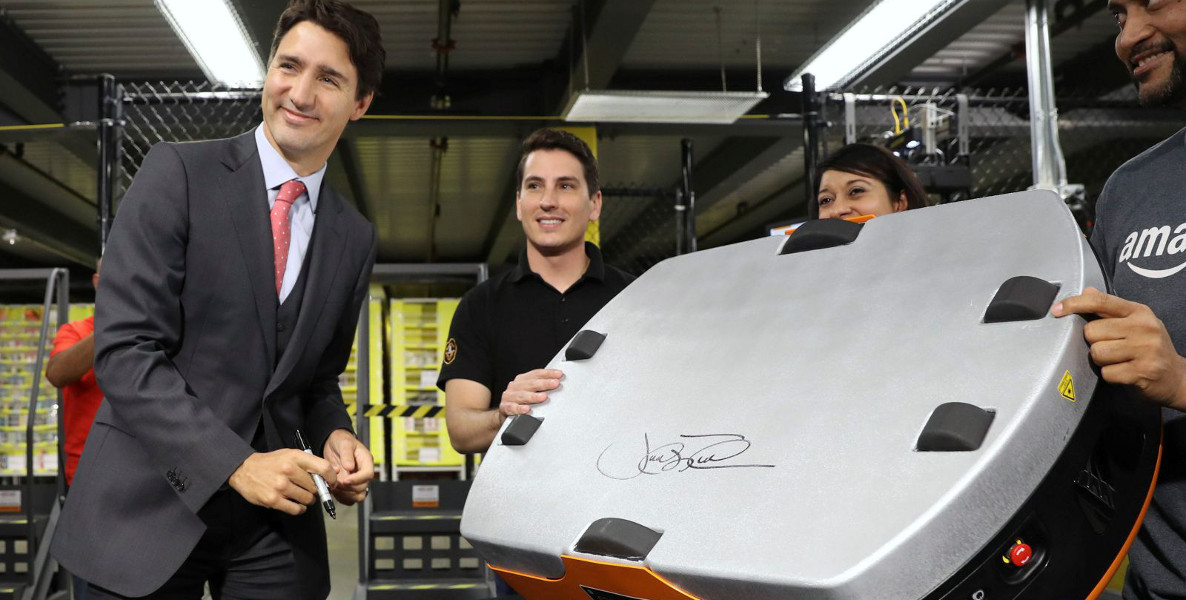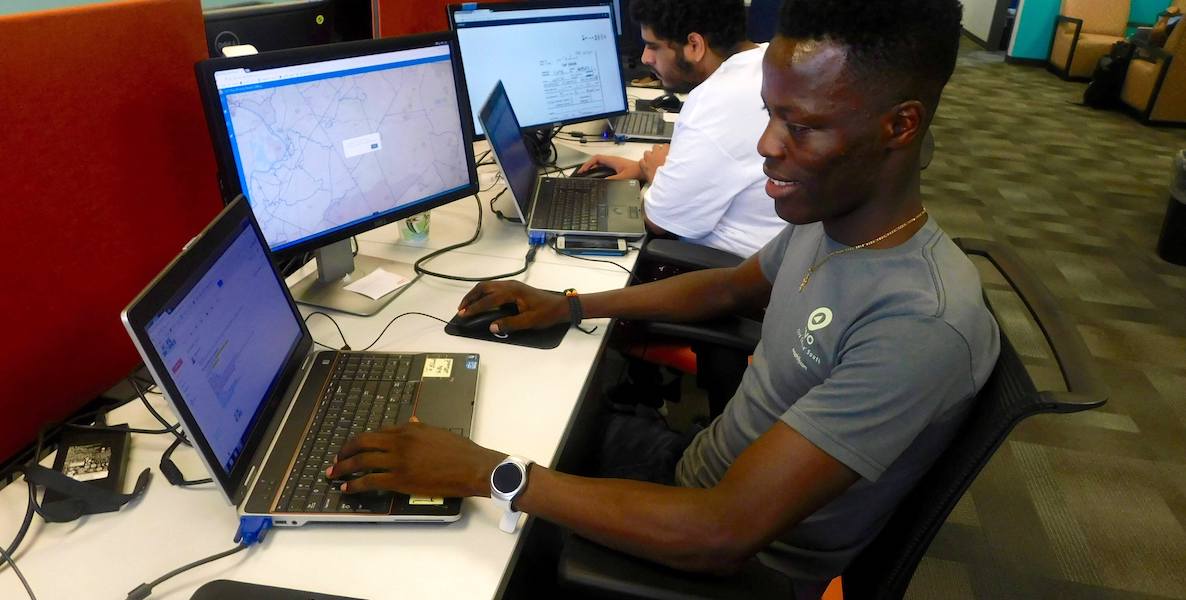Listening to Marcel Njighe-Tezeh (pictured above) tell his story, one hears the American dream come to life.
In 2016, at 17, he left his home in Cameroon, West Africa, and travelled to America using scholarship money he won while in high school. He settled in Camden with a family friend whom he’d never even met in-person before coming to the States.
“After graduation, I would sit at home thinking of where I’m going to get a job [and] America was the best choice,” Njighe-Tezeh says. “I know maybe someone that was born in America and who has always been in America will not understand, but outside of America, we call America the land of opportunities and possibilities. So one of the drives for me was to just get out there, go to America and achieve my goals.”
![]() As he tells it, Njighe-Tezeh left Cameroon because he felt there were no opportunities for him. In high school, he studied accounting and he planned to continue his studies by going to college in America; but the scholarship money only covered the costs of traveling to the U.S., not studying here.
As he tells it, Njighe-Tezeh left Cameroon because he felt there were no opportunities for him. In high school, he studied accounting and he planned to continue his studies by going to college in America; but the scholarship money only covered the costs of traveling to the U.S., not studying here.
Months after arriving in the U.S., Njighe-Tezeh was working in a warehouse, still looking for opportunities to launch his career. As an accounting student, he had learned to follow and understand trends, and he saw that the tech industry was a field with tons of employment opportunities. He just needed the skills to get a job.
His interest in technology and a Google search led him to Hopeworks, the 22-year-old Camden-based nonprofit that offers job training and employment in tech to young people aged 17 to 26. Thanks to that training, Njighe-Tezeh is now a full-time IT specialist with the Philadelphia Parking Authority.
RELATED FROM THE CITIZEN
Hopeworks, a nonprofit that helps at-risk youth, is so successful, it’s facing an identity crisis. Should it expand into other cities or teach others how to do what it does?
“[Hopeworks] brought me in by answering all the questions I had and then introducing me to the career paths that I could have, if I could get through the tech training,” Njighe-Tezeh says.
Njighe-Tezeh is just one of so many Hopeworks success stories. Over the last five years, Hopeworks has helped approximately 100 people each year find jobs. Over the next three years, they’re hoping to double the number of yearly placements they make by growing the three businesses they operate and building talent pipelines for local tech companies. And this year, the organization is stepping up its efforts even more, with programs aimed at also helping small businesses in Camden.
In January, the group launched the Camden Capacity Fund, which aims to help small businesses and nonprofits with their technology needs by offering Hopeworks’ technology and web design services to them. Next month, they’re opening a coworking space within their existing Covid-safe office, to support alumni of the program who’ve pivoted to remote work. And they’re looking to expand the network of businesses at which they match graduates of their programs, so that they can employ even more young people and start to reduce regional poverty.
Steady growth
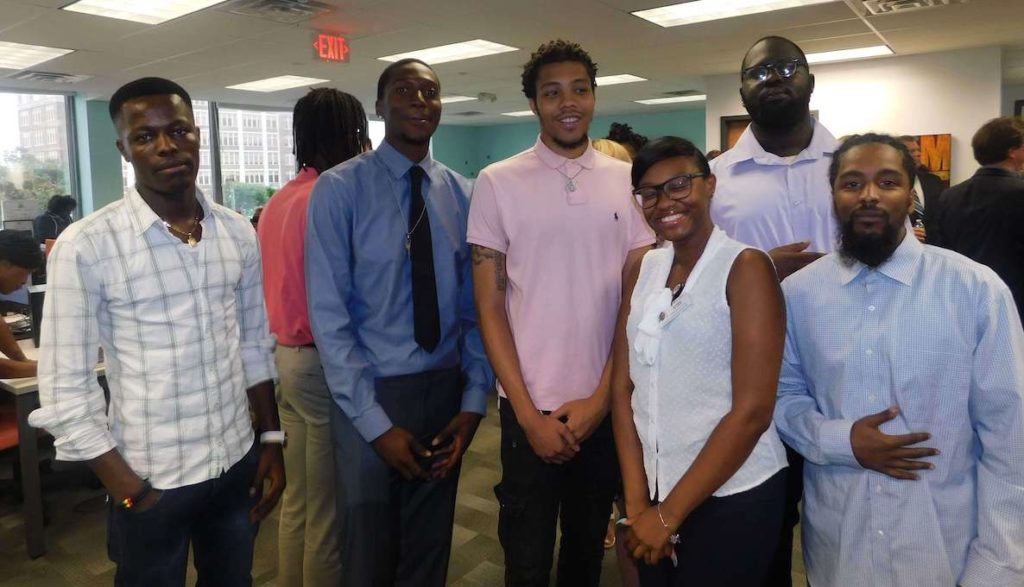
Founded in 1999 by a group of three churches in Camden, Hopeworks spent its first year applying for grants, and in 2000 they formed a board of directors and opened the doors to their headquarters—a row home on State Street in North Camden.
Now, Hopeworks runs a three-month, paid training program for young people looking to develop tech skills; manages a residential community called CRIB where alumni and current interns can live together; and operates three businesses—one in web design, one in data organization and visualization, and one in trauma training for businesses—where their graduates can gain job experience before they begin job searches outside of the organization. In 2018, they opened up a new headquarters to accommodate their growing operations.
They’ve worked with tech companies and other businesses across Camden and Philly, including Penji, Promptworks and New Jersey American Water to provide educational and employment opportunities.
“A lot of programs are like, Oh, we’re gonna help these young people, they need us. That’s not what Hopeworks is doing,” Rhoton says. “What Hopeworks offers is tech training, sure. But what we really offer is that we understand how much value [young people] can offer.”
The group adopted a trauma-informed approach known as the Sanctuary Model in 2012 after seeing their students struggle with trauma after moving into CRIB. Developed by Drexel’s Dr. Sandra Bloom, the Sanctuary Model addresses childhood trauma and organizational stress simultaneously, in order to help people who have experienced trauma manage their emotions in a healthy way.
Dan Rhoton, executive director of Hopeworks, attributes part of the group’s success to its willingness to not only address the trauma young people in Camden have experienced as a result of the city’s poverty, but to view their life experiences as an asset. The young people who come to Hopeworks, he says, are already equipped with soft skills like motivation, courage and resilience; what they need is technical training, and help processing the trauma they may have experienced.
“A lot of programs are like, Oh, we’re gonna help these young people, they need us. That’s not what Hopeworks is doing,” Rhoton says. “What Hopeworks offers is tech training, sure. But what we really offer is that we understand how much value [young people] can offer.”
![]() Rhoton points to Njighe-Tezeh’s story as one where Hopeworks just needed to give him the skills he needed to succeed. In September of 2017, at age 18, Njighe-Tezeh began training at Hopeworks, learning skills like web design, data visualization and other technical skills. One week into his training, he quit his warehouse job because he found he was able to live off the approximately $1,000 stipend Hopeworks provides to its students during the three-month training program.
Rhoton points to Njighe-Tezeh’s story as one where Hopeworks just needed to give him the skills he needed to succeed. In September of 2017, at age 18, Njighe-Tezeh began training at Hopeworks, learning skills like web design, data visualization and other technical skills. One week into his training, he quit his warehouse job because he found he was able to live off the approximately $1,000 stipend Hopeworks provides to its students during the three-month training program.
Eventually, his training at Hopeworks led him to an internship with American Water, doing data work for the water utility. Now, less than four years after first walking through Hopeworks’ doors, he has a full-time, salaried position with PPA that involves monitoring cybersecurity threats, maintaining software on company equipment, and diagnosing issues with hardware and software on company equipment.
RELATED FROM THE CITIZEN
Philly software company Promptworks proves that investing in the well-being of employees and the community can be good for the bottom line, too
Given the success they’ve had with Njighe-Tezeh, PPA has created a second position, to be filled by another Hopeworks’ graduate.
In addition to his job with PPA, Njighe-Tezeh is studying computer science at Rowan University and is on track to graduate this spring with his bachelor’s degree. Njighe-Tezeh says Hopeworks gave him an education in many areas, including the importance of self-discipline.
“What can I teach someone who has a story like Marcel’s? Or stories like the hundreds of other young people come through [our doors]?” Rhoton says. “All I can do is lend them my access, and a little bit of training, and then get out of the way.”
Pandemic responsiveness
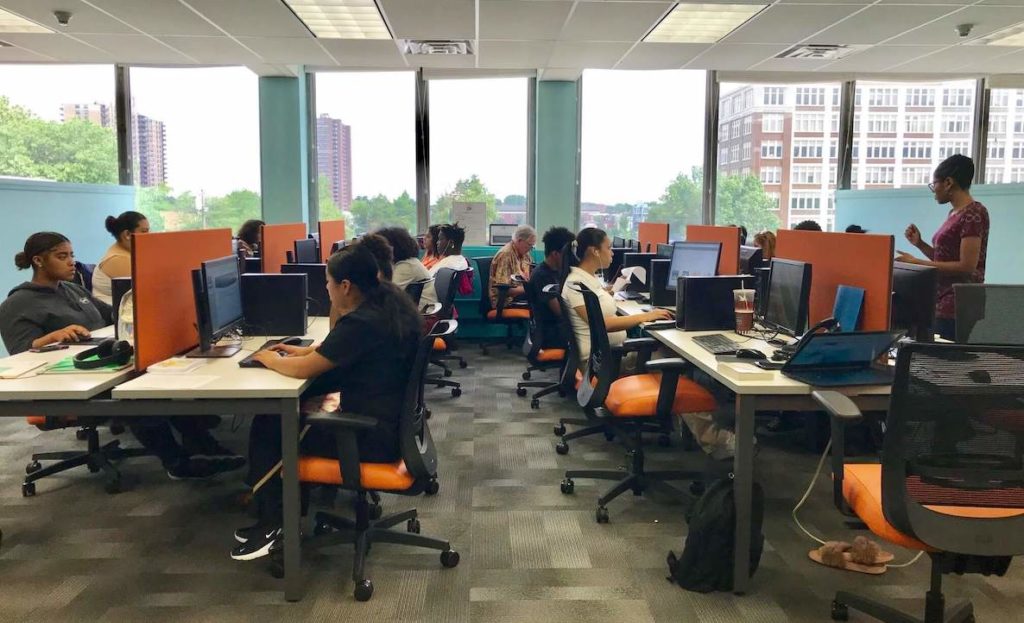
When the pandemic hit the Philly area last March, Hopeworks knew it couldn’t shut down operations. Unemployment in the Camden jumped from 3.6 percent in March of 2020 to 15.1 percent in April and has continued to remain high, according to data from the Bureau of Labor Statistics. Rhoton says that the families of many of Hopeworks’ youth lost their jobs, making it critical that the organization help them stay employed.
“Taking two weeks off or going on a hiatus was not an option,” Rhoton says. “There’s never been a day that the office hasn’t been open for young people to come in.”
Hopeworks distributed over 130 laptops to alumni and current students to ease the transition to remote work, and they adopted a hybrid model for their physical offices so that people who are unable to work from their homes due to a lack of internet access could retain their jobs. Even with spikes in unemployment, their 12-month employment retention rate has remained high at 88 percent.
“Taking two weeks off or going on a hiatus was not an option,” Rhoton says. “There’s never been a day that the office hasn’t been open for young people to come in.”
The switch to remote work has in many cases actually helped Hopeworks graduates, who often rely on public transportation, begin jobs with employers based in areas like King of Prussia and Voorhees. In the last 12 months, they’ve helped 128 people find full-time jobs, on par with placement statistics for the last five years, despite Camden’s spiking unemployment rate.
 In order to help a growing number of graduates with remote jobs, Hopeworks on April is opening the Burton R. Cohen Technology Center, a coworking office with desk space, high-speed internet, and phone and conference room access.
In order to help a growing number of graduates with remote jobs, Hopeworks on April is opening the Burton R. Cohen Technology Center, a coworking office with desk space, high-speed internet, and phone and conference room access.
Membership at the co-working space is free for alumni, though continued engagement with the Hopeworks community is required as part of the program: Members are required to participate in governing and leadership councils, engage in community activities and networking events, and mentor early-stage professionals. Rhoton says that they already have alumni who are interested in reserving spaces.
RELATED FROM THE CITIZEN
A small new Science Center program trains overlooked Philadelphians for careers in our city’s burgeoning life sciences industry. Its mission: carving out a path to high-paying, in-demand jobs
In addition to offering space to work, Hopeworks will have industry mentors working alongside alumni in the space, who can help answer questions and provide professional development opportunities.
Even before the pandemic, Hopeworks launched the Camden Capacity Fund in January of 2020, which offered small businesses and nonprofits in Camden Hopeworks’ professional services including web development and design, trauma-informed training, and GIS and data services, which help businesses collect, organize and analyze data.
The project is funded through the Hummingbird/Hummel Foundation and it has had the unexpected benefit of being able to help keep Hopeworks youth employed during the pandemic while also helping small businesses that have been struggling as a result of the virus. Nonprofits that are selected to receive Hopeworks’ technology services are asked to pay for some of the costs and the difference is paid for by donors to the fund.
Rising to challenges
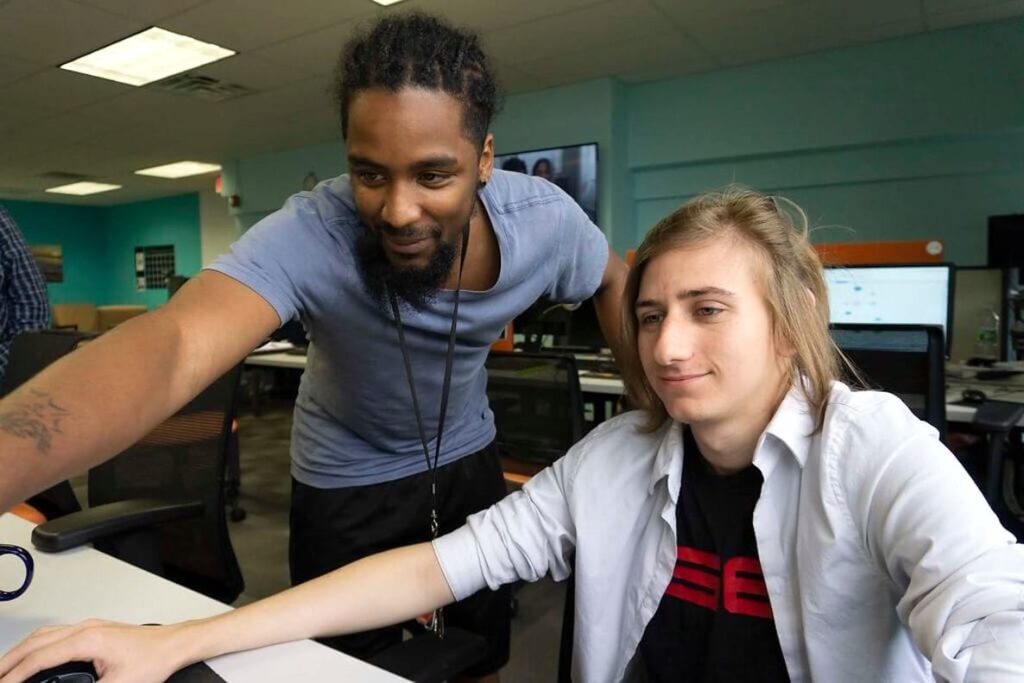
Covid-19 isn’t the only event from 2020 that changed the way Hopeworks operated. After last summer’s Black Lives Matter protests, tech companies started approaching Hopeworks and asking them to build talent pipelines to help diversify their workforces.
“All these tech companies kind of woke up to the idea that we have to start taking these diversity commitments seriously,” Rhoton says. “The phone was ringing off the hook.”
Seer Interactive, Linode and American Water are among the companies that Hopeworks is working with to create custom talent pipelines. Through these programs, companies provide Hopeworks with a list of skills they need entry-level employees to have. Hopeworks then trains people in these areas and after their training is complete, students have guaranteed job opportunities.
“All these tech companies kind of woke up to the idea that we have to start taking these diversity commitments seriously,” Rhoton says. “The phone was ringing off the hook.”
These talent pipelines are one way Hopeworks hopes to achieve its latest goal: decreasing poverty in the region. Rhoton estimates that the organization will have to double or even triple the number of young people coming through Hopeworks’ doors to start to “move the needle” on regional poverty.
To do this, Hopeworks plans to grow its three businesses by expanding to areas outside of the region. They plan to take advantage of the ways the pandemic has normalized remote work by starting to seek clients in other markets.
“I think, given a shot, we can outcompete anybody,” Rhoton says. “We want to get to a point where we can start to move the needle on regional poverty … [helping] 500 people per year is kind of the magic number we’re going for.”
RELATED FROM THE CITIZEN
Camden-based design company Penji doesn’t just create graphics, it fuels opportunities
This isn’t Hopeworks’ first run at expanding. In 2017, they launched a five-month pilot program with JEVS Human Services in Northeast Philadelphia. Ultimately after the Philadelphia pilot program ended, a cost analysis revealed that it was often easier and less expensive for young people to cross the river into Camden than get from one side of Philly to the other. With Philadelphia’s public transit system, a student living in West Philadelphia would have to take three different trains to get to Northeast Philly offices. The same student would only have to take two trains to get to Camden.
The decision to end that pilot program, Rhoton says, is part of Hopeworks’ broader desire to grow smartly. In order to reduce regional poverty, Rhoton says, the organization needs to grow in a way that is efficient and cost-effective, sure, but it also meets the needs of the communities they serve.
“We’re going to grow, but not kind of hodgepodge. We’re going to grow where there’s a demand for our services,” Rhoton says.
The Citizen is one of 19 news organizations producing Broke in Philly, a collaborative reporting project on solutions to poverty and the city’s push towards economic justice. Follow the project @BrokeInPhilly.
RELATED VIDEO CONTENT
Hopeworks alumnus Marcel Njighe-Tezeh



